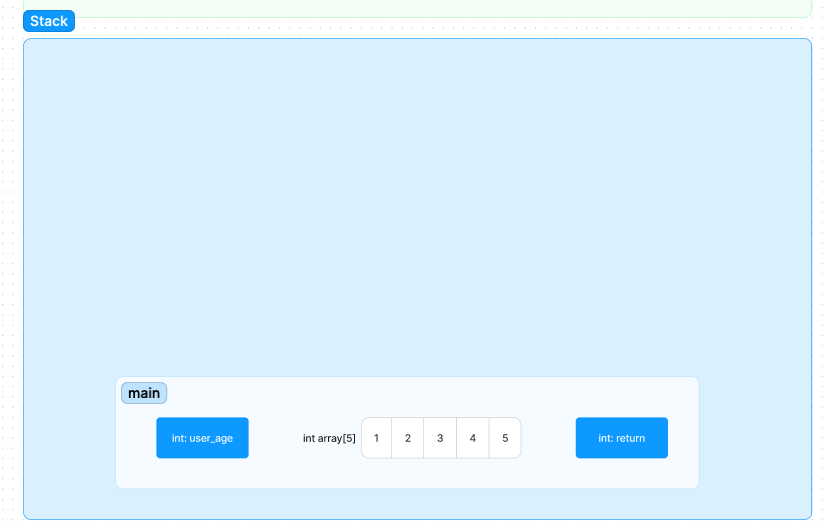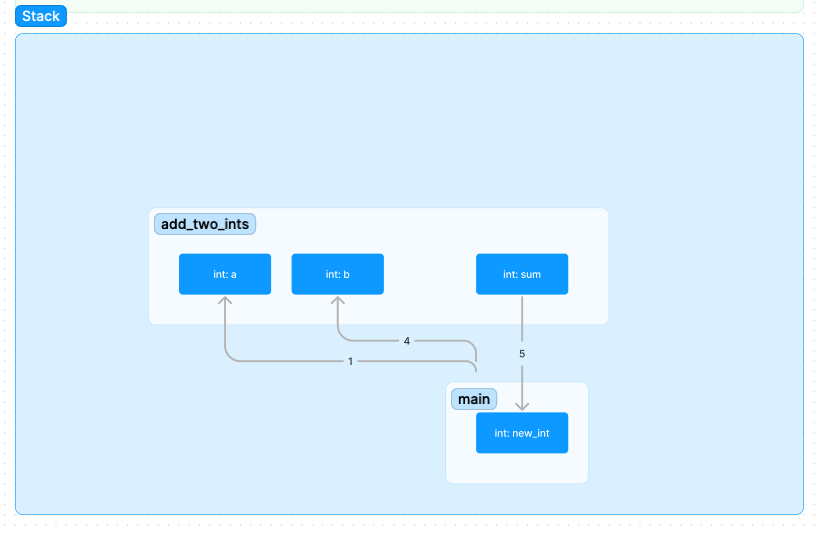Assignment 1 due reminder
Good luck <3
Pointers Recap
- Used to store a memory address
- Can point to any type of data (int, struct, array)
- The data at the address can be accessed (dereference)
* - The address at a variable can be retrieved (address_of)
&
Pointers syntax cheat sheet
- Declare a pointer:
int *int_pointer; - Address of:
&my_variable; - Dereference (Get the value at a pointer):
*int_pointer;
Dynamic Arrays and Memory
The Stack
- Where information about your program execution is stored
- Which functions are called, in what order
- Which variables are created, and where
- When a block of code is executed
{ }, a stack frame is created - When the block is completed, the stack frame is removed (and anything inside it destroyed)
When a stack frame is created, enough memory to store everything in the frame is allocated to the frame
The Stack
int main(void) {
int user_age = 20;
int array[5] = {1, 2, 3, 4, 5};
return 0;
}

The Stack
int add_two_ints(int a, int b) {
int sum = a + b;
return sum;
}
int main(void) {
int new_int = add_two_ints(1, 4);
retrun 0;
}

Quick demo + whiteboard
What if we want to create memory with an undetermined size?
- We can't use stack frames... the program needs to know how big the frame is before it creates it
Enter: The Heap
- The Heap is a large block of memory that sits outside the stack
- Unlike the stack, the heap is managed entirely by the programmer (in C)
- Nothing is automatically declared or destroyed in the Heap, you have to manage it all! (This can be dangerous)
- With great power, comes great responsibility

Using the heap
C provides us some functions to interact with the heap.
malloc()
malloc-> Memory Allocation (allocate memory on the heap)- Returns a pointer to the location on the heap
- We can decide how large the allocation
Calling malloc
ptr = (cast-type*) malloc(byte-size)
Example:
#include <stdio.h>
int main(void) {
malloc(1000);
malloc(sizeof(int));
malloc(sizeof(char) * 50);
return 0;
}
Whiteboard
Dynamic arrays on the heap
A common way of using malloc is to create dynamic arrays:
int main(void) {
int num_elements;
scanf("%d", num_elements);
int *data = malloc(num_elements * sizeof(int));
return 0;
}
Freeing malloc'd data
- This is where the responsibility comes in...
- C automatically frees stack frames after they finish, meaning we don't have to clean up after ourselves.
- We need to manually clean up the heap, otherwise we will cause a memory leak.
free
int *data = malloc(num_elements * sizeof(int));
...
free(data);
realloc
- Either resizes the existing allocation (freeing what is no longer needed)
- Or allocates a new allocation
- Always returns the address of the new allocation, even if it's in the same position
realloc
int *data = malloc(num_elements * sizeof(int));
num_elements += 40;
data = realloc(data, num_elements * sizeof(int));
...
free(data);
Remember, we can treat pointers like arrays
Demo
Feedback
